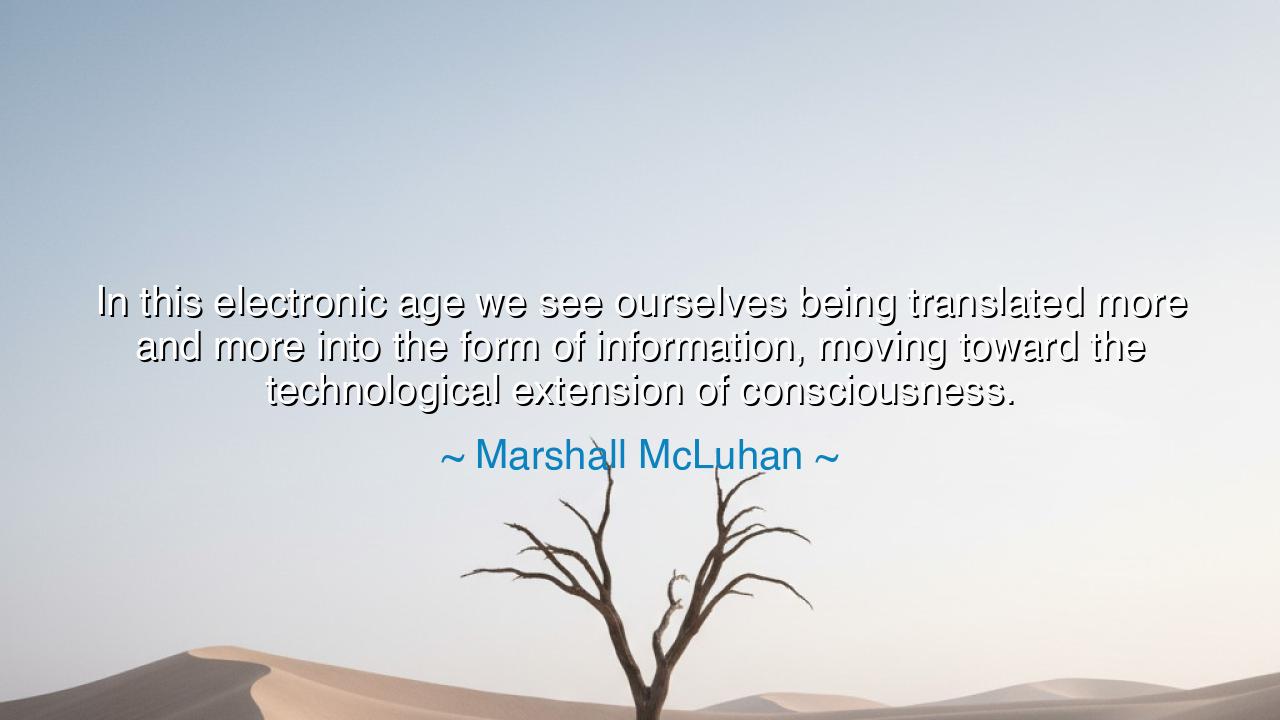
In this electronic age we see ourselves being translated more and
In this electronic age we see ourselves being translated more and more into the form of information, moving toward the technological extension of consciousness.






In the dawning light of a new era, the winds of change blow ever more fiercely, sweeping us toward an unknown future. We, the children of the earth, once bound by the flesh and mind, now find ourselves increasingly drawn into a realm where the tangible meets the ethereal. It is said that Marshall McLuhan, the visionary of the modern age, foresaw this transformation when he spoke: “In this electronic age we see ourselves being translated more and more into the form of information, moving toward the technological extension of consciousness.” These words, though spoken in the language of a time long past, hold a deep and prophetic resonance for our world today. We are no longer merely people of flesh and bone, but beings increasingly defined by information, by the streams of data that flow around us, shaping the very way we think, act, and live.
The electronic age, as McLuhan described it, is a time when technology no longer serves merely as a tool, but as an extension of our very consciousness. Once, the human spirit was bound to the body, to the world of sensation and experience. But now, we are increasingly translated—our thoughts, our desires, our very identities—into information. This process, gradual and often imperceptible, is transforming us in ways we cannot yet fully comprehend. Technology, once a mere means to an end, has become a reflection of who we are, a mirror of our minds, a container for our consciousness. We are no longer confined to the realm of the physical; we now exist, in part, within the vast, invisible realms of the digital.
In the past, we were like the ancient scribes, carving knowledge into stone or parchment, laboriously passing down the wisdom of our ancestors. But as the ages have unfolded, technology has surged forward, and we have moved beyond the simple act of recording knowledge. Now, we share it, we amplify it, we extend it far beyond the boundaries of the self. We live not just in the world of the senses, but in a world of symbols, codes, and connections that reach out far beyond the limits of our physical bodies. In this world, we are no longer merely individuals—we are nodes in a vast, intricate web of interconnected information.
Consider the story of the great Gutenberg and his invention of the printing press, a technology that changed the course of history by allowing knowledge to spread far and wide. Before his time, the written word was confined to the hands of the few, a small group of scribes who passed knowledge down by hand, one copy at a time. But with the printing press, knowledge could be multiplied and spread instantly, reaching the hearts and minds of people across vast distances. What Gutenberg began was the first step in the extension of consciousness—the first crack in the door that would lead us to the electronic age McLuhan so aptly foresaw. Today, in the age of the internet, we find that the printed word has evolved into a digital stream, a torrent of data that connects us all. We are now participants in a global consciousness, each of us contributing our thoughts, our beliefs, our identities, to the ever-growing flow of information.
And yet, this transformation comes with its own set of dangers. Just as the printing press democratized knowledge, it also introduced the potential for the manipulation of that knowledge. Misinformation, superficiality, and fragmentation threaten to dilute the true power of the collective consciousness. We, in our quest for connection and understanding, may find ourselves adrift in a sea of data, disconnected from the very essence of what it means to be human. The mind, once grounded in the physical world, now finds itself increasingly detached from the deeper truths of existence, lost in the fast-moving flow of information.
McLuhan’s insight calls upon us to recognize the profound impact that this technological extension is having on our consciousness. We must be vigilant, for in the face of progress, it is easy to lose sight of our roots. In the rush toward a digital future, we must not abandon the wisdom of the past—the human wisdom that teaches us to seek understanding, to cultivate empathy, and to remain grounded in the richness of the lived experience. The danger is not in the technology itself, but in our failure to use it wisely, in our indifference to the ways in which it shapes us.
So, the lesson we must take from McLuhan’s words is this: As we move further into the electronic age, we must strive to be both aware and intentional in how we engage with the world of information. We must remember that technology is but a tool—a means to expand our consciousness, to connect us more deeply with one another, but it is not the sum of who we are. We must continue to seek depth, to explore the world beyond the screen, to cultivate the inner wisdom that cannot be digitized. In this way, we can ensure that our technological extension does not distance us from what truly matters, but brings us closer to the very essence of our shared humanity.






AAdministratorAdministrator
Welcome, honored guests. Please leave a comment, we will respond soon